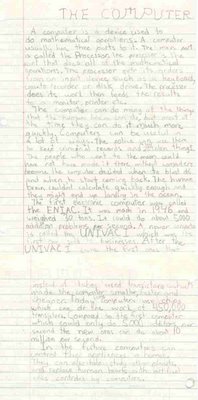Alfred Thompson asks me in the comments section of
his post:
Well Peter, why do you avoid teaching students how to use any proprietary language or user-level application?
It is a very straightforward, simple and legitimate question. I thank Alfred as I believe it to be an important question that deserves a response. My response...
I avoid teaching using proprietary technologies because such practice is antithetical to the broader purpose of education.
Obviously, learning technical skills and concepts is part of what it means to educate students. This is what is covered by the written curriculum. However, those goals are of minor relevance compared to challenging the
hidden curriculum. To challenge the contemporary hidden curriculum implies looking to values such as cooperation, sharing, and goodwill toward others. Not a single one of these values can be assessed through a standardized test. Not a single one of these values can be pinpointed in a unit plan or curriculum map. Not a single one of these values are attained through repetitious training or memorization.
So as a teacher of technology I must ask myself - What is a right relationship with technology? What kind of relationship with technology will benefit the world as a whole? What kind of interaction with technology expresses a genuine spirit of cooperation, sharing, and goodwill toward others? If I do not address these questions throughout my career, I am not teaching - I am merely training.
Addressing these questions means an honest investigation of our technological environment. Addressing these questions is not an easy task as technology is a broad discipline - there are many issues. But when it comes to software, I believe that
free software is an ethically sound option that challenges the current values of technology's hidden curriculum. Currently, most schools that can afford to teach computer technology do so using proprietary software. It is a fact that proprietary software technologies embody values rooted in competition, exclusion, and individual subjugation. While such values may have legitimacy in particular areas, they are in contradiction to the spirit of scientific inquiry and the pursuit of human knowledge.
Competition in schools belongs on the volleyball and basketball courts, not in software licenses. Therefore, I do my best to avoid teaching students proprietary software applications or languages implemented in a proprietary environment.





